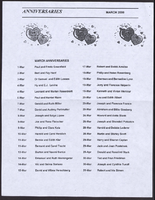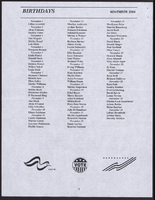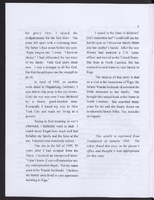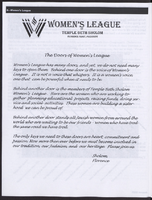Search the Special Collections and Archives Portal
Search Results
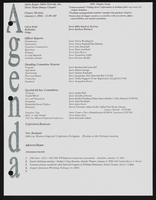
Alpha Kappa Alpha Sorority, Theta Theta Omega Chapter committee chairs and members list
Date
Archival Collection
Description
From the Alpha Kappa Alpha Sorority, Incorporated, Theta Theta Omega Chapter Records (MS-01014) -- Chapter records file.
Text
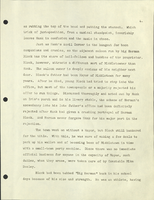
Correspondence and synopsis for Good Ole Hank, television series proposal, June 1955
Date
Archival Collection
Description
The manuscript synopsis for the television series Good Ole Hank is accompanied by a letter from Harry Cohn of Columbia Pictures (Hollywood, Calif.), rejecting the proposal.
Text
Donn Arden Papers
Identifier
Abstract
The Donn Arden Papers (1910s-1990s) document Arden's sixty-plus years in the entertainment industry working in showrooms and nightclubs all over the world including Paris, France, Las Vegas, Nevada, New York, New York, and Los Angeles, California. Donn Arden worked as a choreographer, producer and director known for creating extravagant production shows that combined spectacular scenery and disaster with sequined and feathered showgirls. The collection is comprised of production notes, programs, photographs, posters, sheet music, correspondence, costume design sketches, press clippings, and magazine articles.
Archival Collection

Transcript of interview with Don Laughlin by Stefani Evans and Claytee White, October 10, 2016
Date
Archival Collection
Description
Minnesotan Don Laughlin landed far from the land of (more than) 10,000 lakes. His office 90 miles south of Las Vegas in the eponymous town of Laughlin commands an unimpeded view of a very different landscape from that of his youth. Here, where the Colorado River flows south through one of its narrowest channels, Laughlin arrived in about 1966 and purchased what would become the Riverside Resort Hotel and Casino. The endeavor was so successful that the then-settlement of 10 to 15 people at that tiny spot on the river grew to be an unincorporated town housing more than 7,000 people in 2010. Today, Laughlin the man continues to promote and support Laughlin the town via flood control projects and infrastructure development. In this interview, Laughlin sits amid the antique slot machines in his office and enjoys the view as he recalls his childhood on the family farm in southern Minnesota, and talks about leaving the farm in the late 1940s for nearby Owatonna to do watchmaking and watch repairing while simultaneously running a slot machine and pinball parlor. After visiting Las Vegas on vacation, he arrived permanently in 1952 and bartended at the Thunderbird Hotel until he bought his own bar and restaurant in Downtown Las Vegas, which he named Laughlin’s Made Right Café. After selling the café, he bought the 101 Club in North Las Vegas. He began searching for a casino for a casino to buy, seeking only those located on the border of a state that did not allow gambling. When he found the small hotel/casino on the Colorado River he purchased it. He talks of building an airstrip across the street and making daily trips to Las Vegas to buy groceries, beer, and toilet paper-essentially, everything one would need to run a hotel, restaurant, and casino-sometimes making three trips in one day. He continues to own and manage his hotel/casino at the age of 85, and he is in his office every day, all day, seven days a week. He gave up flying last year because he claims he’s too old to pilot his own aircraft. So is especially advantageous that the town that bears his name can now supply almost everything that he and the Riverside Resort Hotel and Casino need.
Text

Transcript of interview with Carl F. Kelley by James M. Greene, May 2, 1972
Date
Archival Collection
Description
On May 2, 1972, James M. Greene interviewed Carl F. Kelley (born May 19th, 1922 in Ohio) about his life in Southern Nevada. The two talk about how Kelley first moved to Nevada and his original addresses. Kelley describes living in Boulder City, Las Vegas, and Henderson. The interview concludes with an in-depth discussion of the Civilian Conservation Corps activities in Boulder City, Nevada.
Text

Transcript of interview with Mary and Bill Laub by Stefani Evans and Claytee White, September 15, 2017
Date
Archival Collection
Description
While offering anecdotes on Southwest Gas Company’s early years—including its flirtation with a nuclear bomb and owning a casino; its purchase of a Kingman, Arizona, ranch with an underground salt dome, and its involvement with the formation of Boyd Gaming—this oral history also reveals Bill Jr.’s role in applying his knowledge of natural gas infrastructure to promote extensive education about building codes, infrastructure, and engineered systems. In particular, Bill discusses EduCode, the internationally recognized, week-long building code institute held annually in Las Vegas that originally began more than twenty-five years ago and has since attracted worldwide participation. While Bill does not teach at the institute, he has helped organize the course since its inception and has been a consistent supporter.
Text

